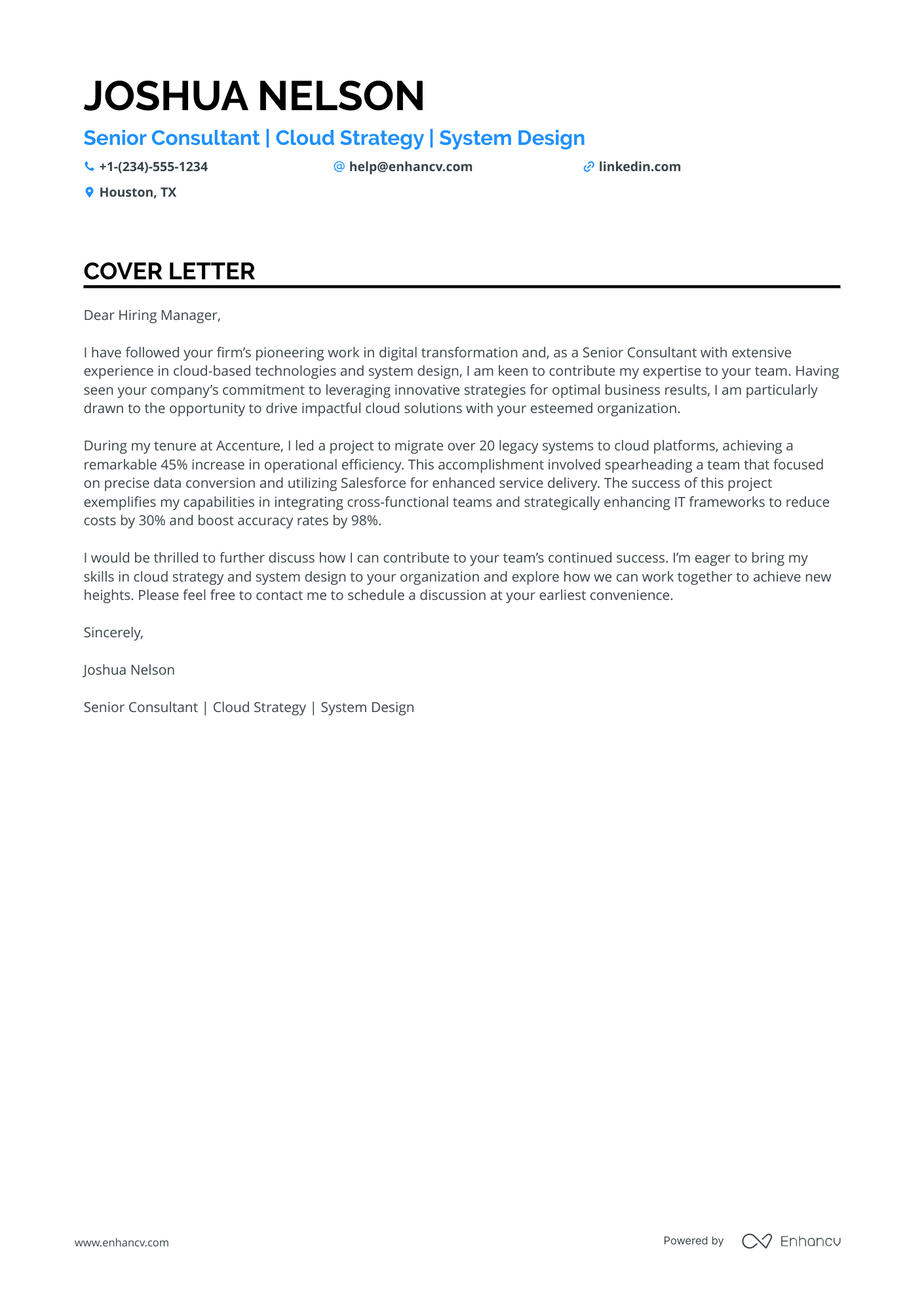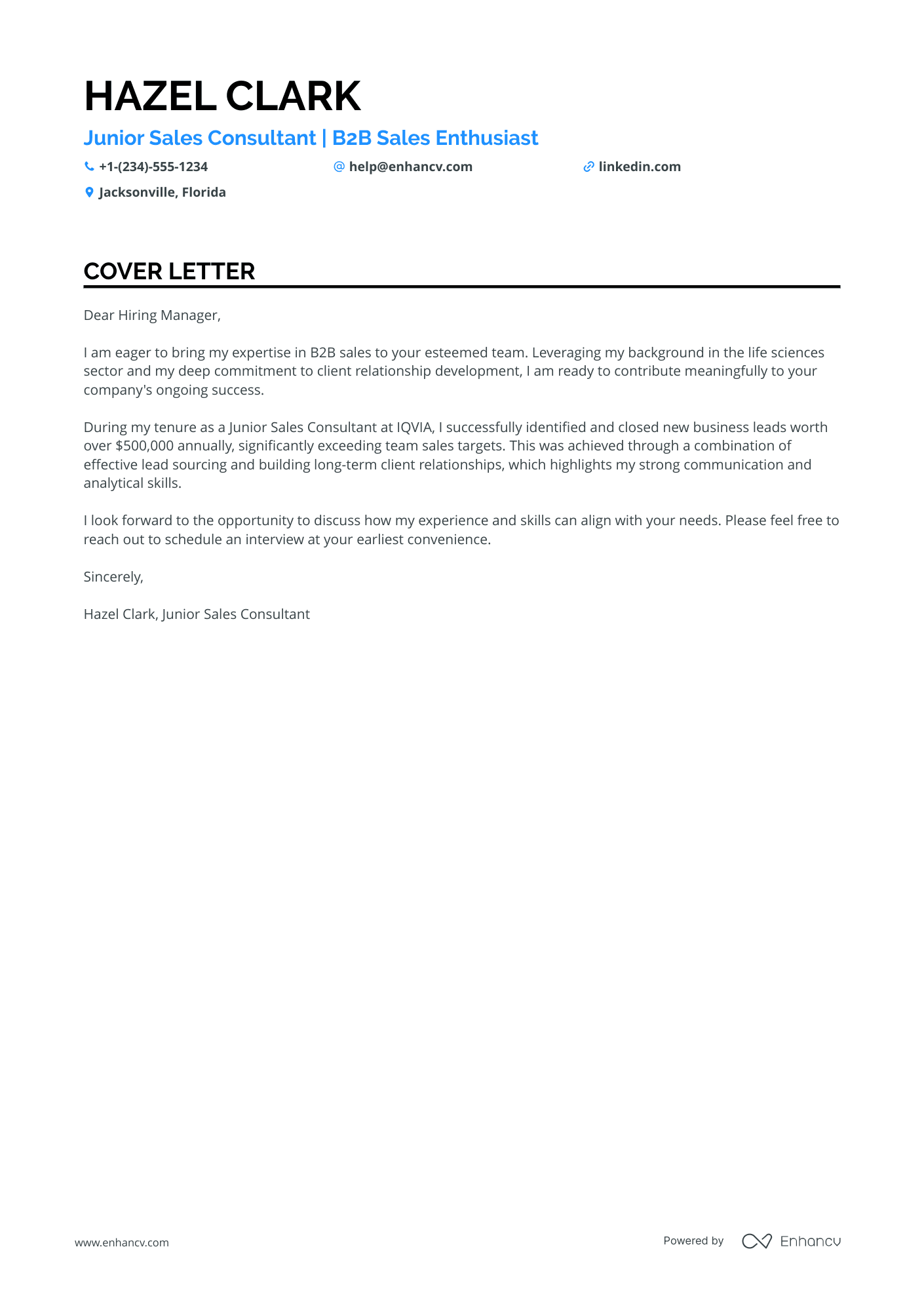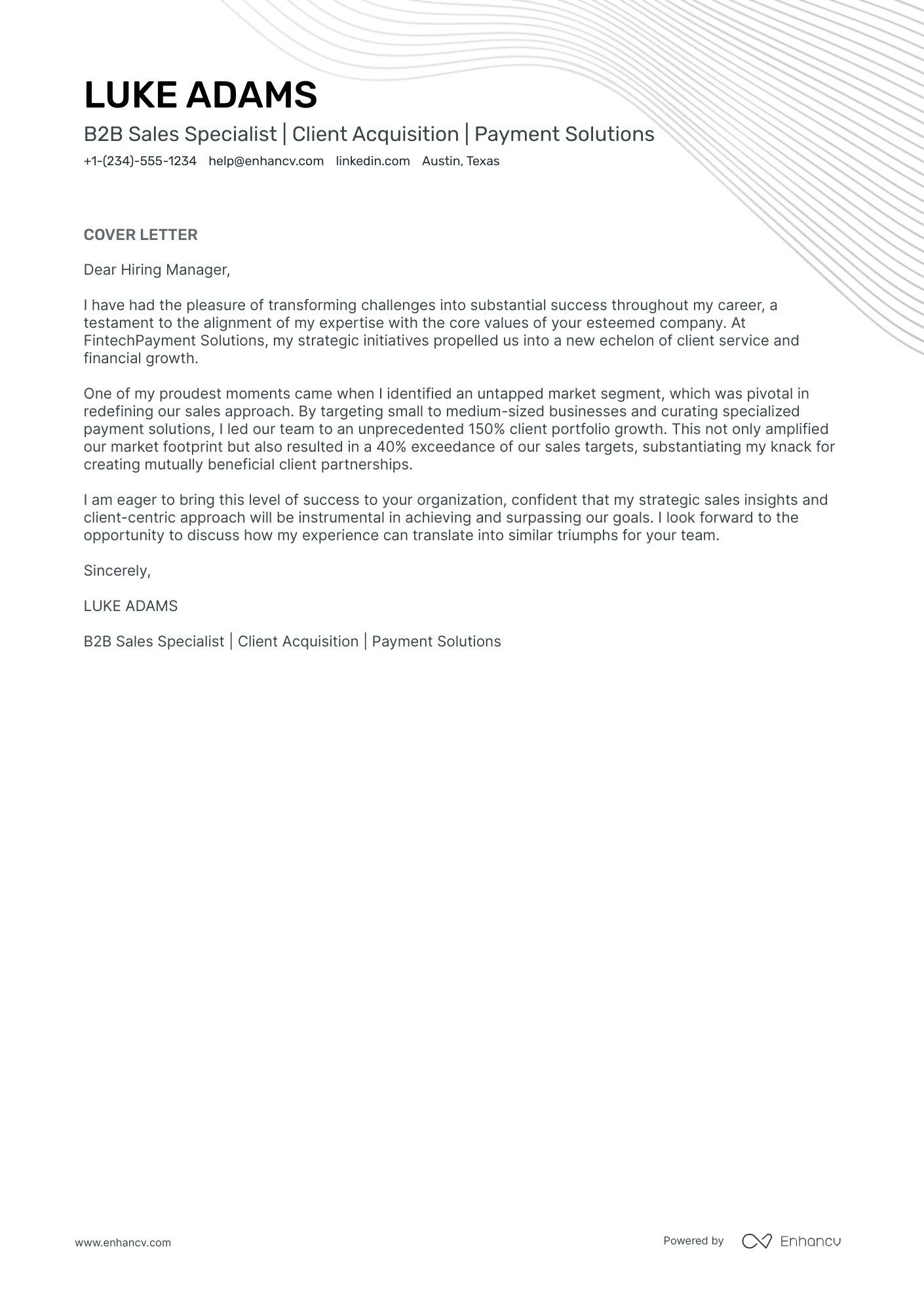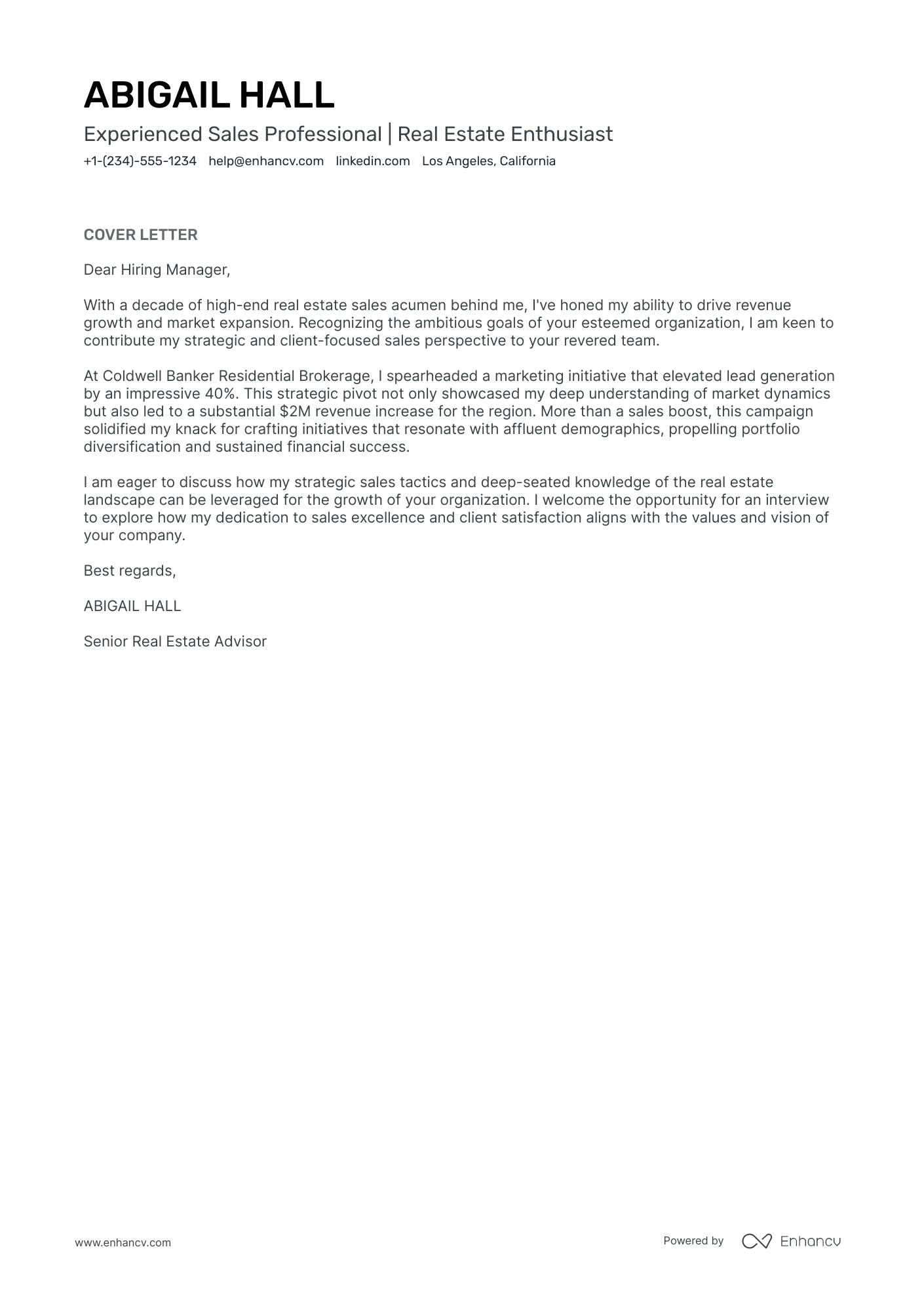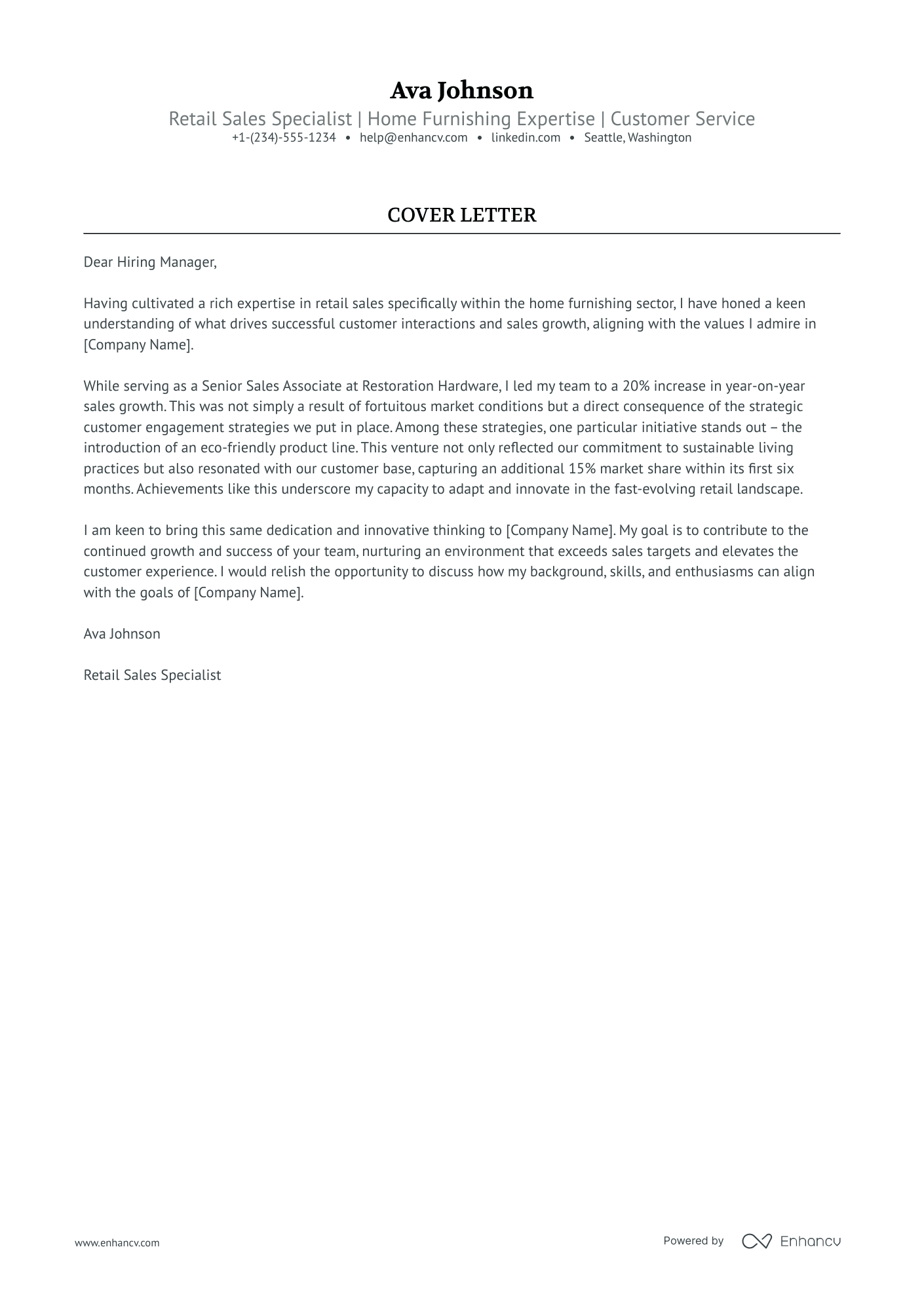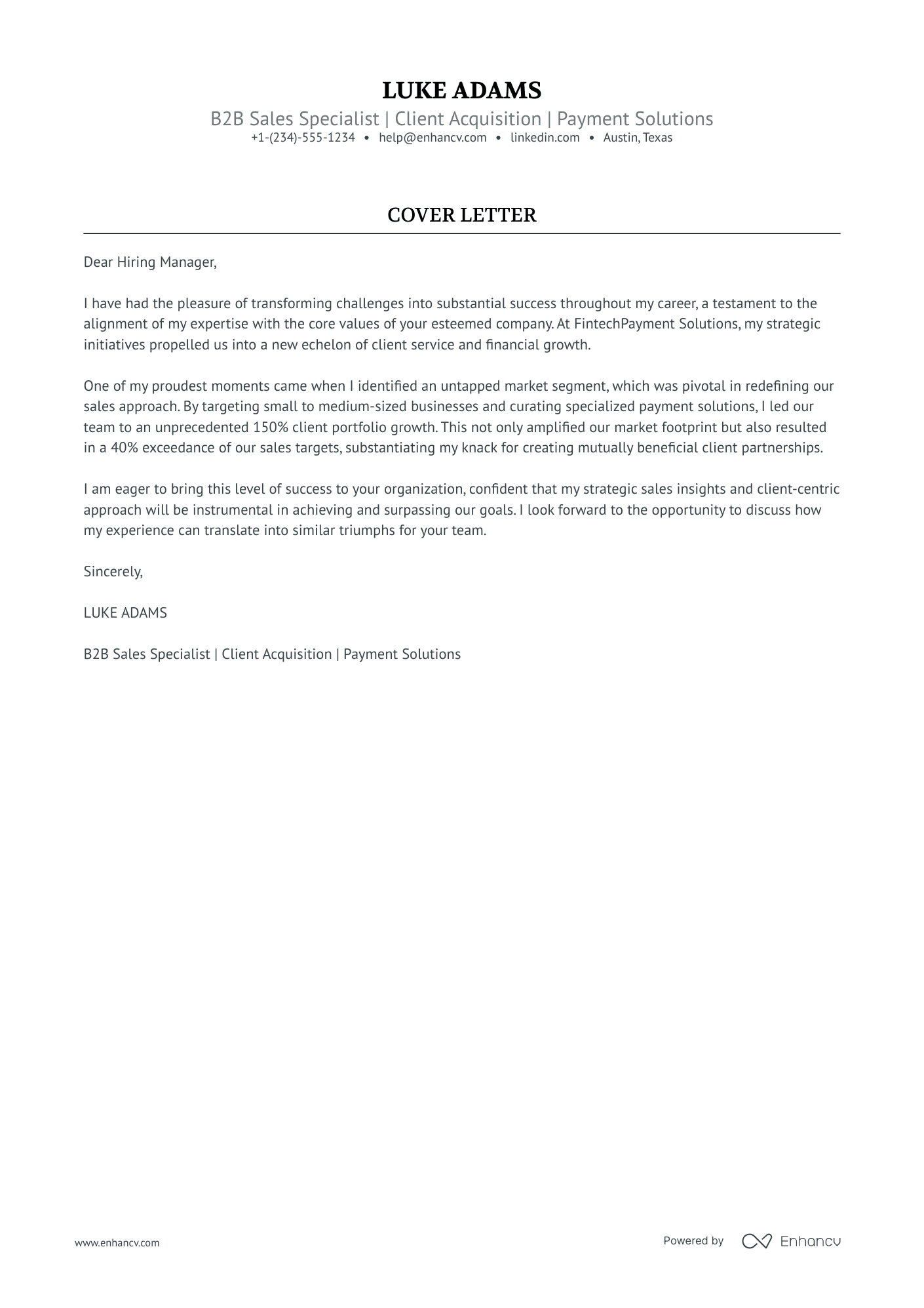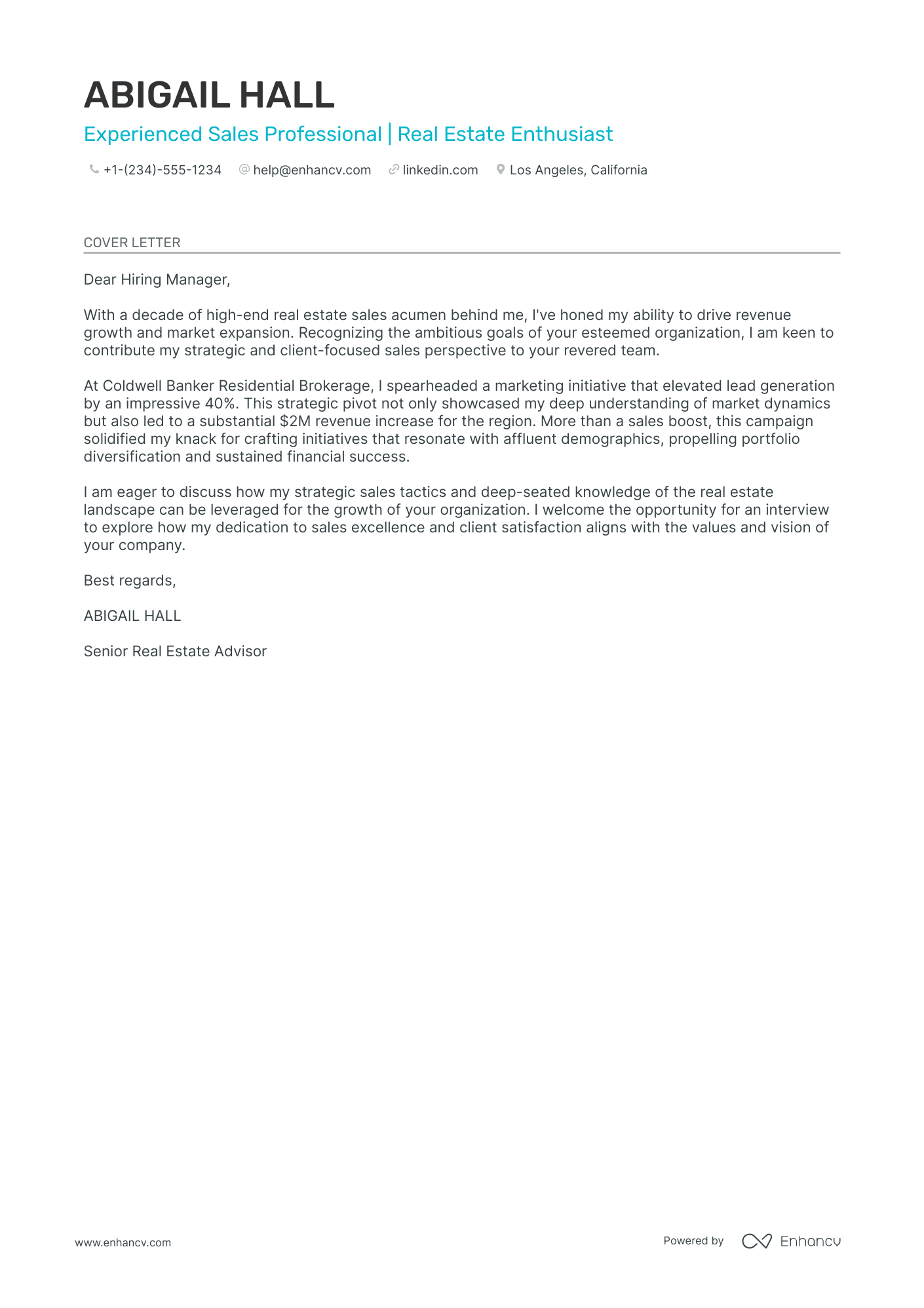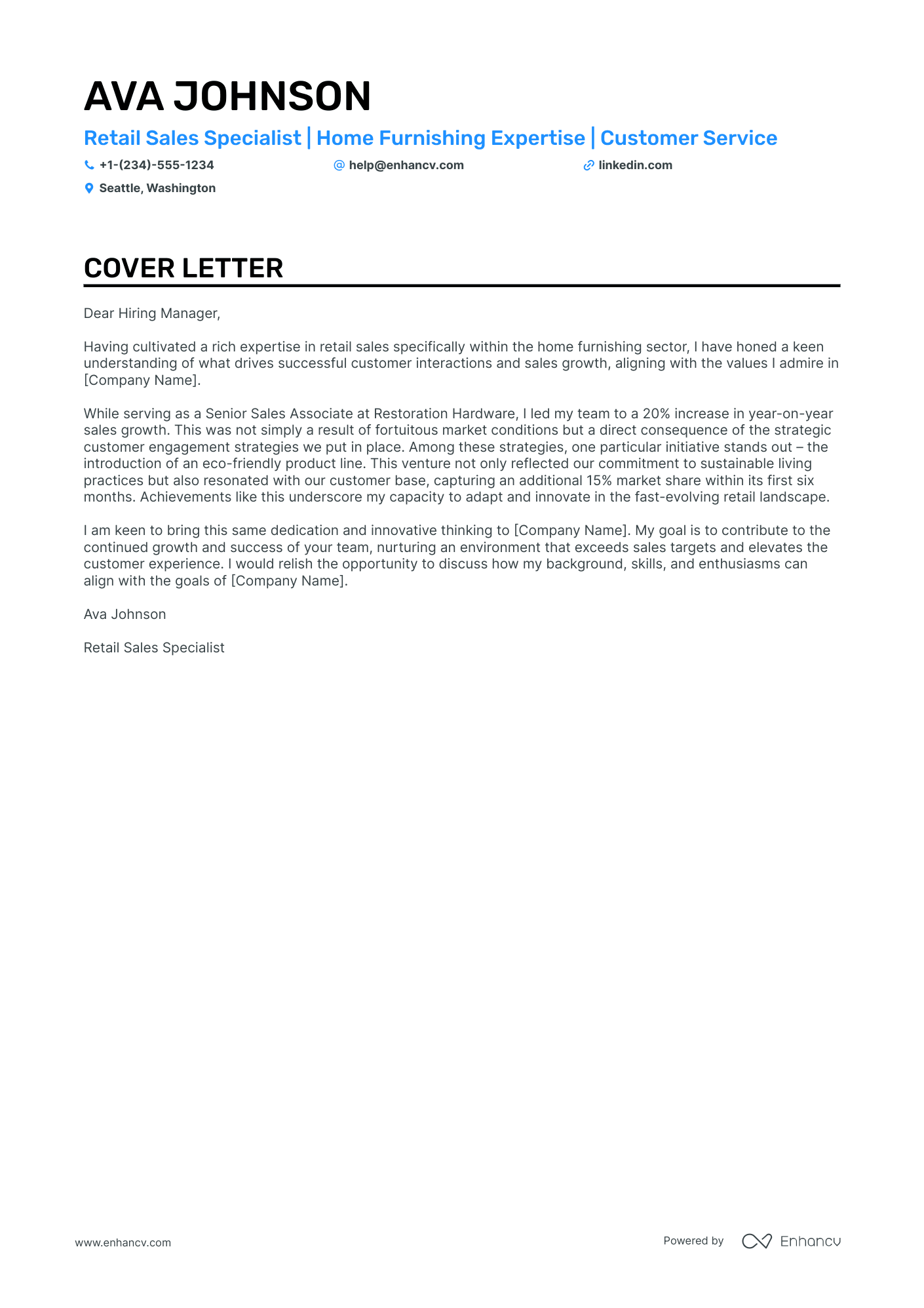As you dive into the job market, your resume often takes center stage, but don't overlook the clout of a compelling sales consultant cover letter. This isn't just a repeat of your resume; it's your chance to spotlight a standout professional triumph—your crowning moment. Keeping it concise, avoid clichés and stick to a single page as you formalize your narrative. Remember, your cover letter is your story, told your way, paving your path to a sales career.
- Write a sales consultant cover letter that helps you stand out (and get the job);
- Understand how to start and end your sales consultant cover letter with the appropriate greeting;
- What to include in the body of your sales consultant cover letter to put your best foot forward;
- Your most important achievements - how to present them as part of your sales consultant cover letter.
And if you want to make your life even easier, simply drag and drop your sales consultant resume into Enhancv's AI cover letter generator, and it will write your cover letter for you in just a few moments.
If the sales consultant isn't exactly the one you're looking for we have a plethora of cover letter examples for jobs like this one:
- Sales Consultant resume guide and example
- Sales Representative cover letter example
- Regional Account Manager cover letter example
- Medical Device Sales Representative cover letter example
- Construction Sales cover letter example
- Cashier cover letter example
- Sales Marketing Manager cover letter example
- Client Support Specialist cover letter example
- Call Center Representative cover letter example
- Starbucks Store Manager cover letter example
- Lead Generation cover letter example
Drop your resume here or choose a file.
PDF & DOCX only. Max 2MB file size.
Sales consultant cover letter example
Zoe Thompson
Philadelphia, Pennsylvania
+1-(234)-555-1234
help@enhancv.com
- Emphasizing a significant achievement such as "amplified company revenue by an impressive 25%" helps to showcase the applicant's impact in previous roles, underscoring proven results and expertise in sales.
- Pointing out leadership skills and the ability to cultivate a team by stating "led and mentored a dynamic team of five" demonstrates the candidate's capability to manage and inspire a team, which is often crucial for senior sales roles.
- Discussing a precise methodology, for example, "comprehensive market analysis that identified untapped opportunities", shows the candidate's strategic approach to sales and an analytical mindset that is valuable in understanding and conquering market challenges.
- Expressing alignment with the company's values and approaches to work, as seen in "commitment to truly understanding client needs and market dynamics", helps to establish cultural fit and suggests that the candidate is likely to integrate well within the company's ethos.
What should your sales consultant cover letter look like - formatting and organizing your information
Have you ever wondered what are the must-have sections you need to include in your sales consultant cover letter? Our builder sets those up for you with:
- Header - dedicated to your contact information, the role you're applying for, and the date (don't forget to include your name);
- Greeting and opening paragraph - to create a personalized and memorable experience for recruiters;
- Body paragraph - emphasizing your skill set and knowledge that aligns with the role and helps you to stand out;
- Closing paragraph - leaving a great impression and ending with an optional signature.
Use a cover letter template to discover the best formatting for your sales consultant cover letter: that is single-spaced paragraphs and wrapping your content in a one-inch margin.
Ensure that both your resume and sales consultant cover letter are in the same font. Stand apart from the crowd by using modern, yet simple fonts, like Chivo and Rubik, instead of the overused Arial and Times New Roman.
Did you know that the Applicant Tracker System (or ATS) won't be assessing your sales consultant cover letter? Instead, submit your profile in PDF to recruiters to keep the same formatting and the design intact.
Need a cover letter, but short on time? Use our free cover letter generator to create one from your resume in no time.
The top sections on a sales consultant cover letter
- Header: This section includes your name, address, phone number, email, and date, allowing the recruiter to easily identify and contact you for potential sales consultant opportunities.
- Greeting: Tailor your greeting to address the hiring manager or recruitment team by name, which demonstrates your attention to detail and interest in creating a personal connection, essential in sales roles.
- Introduction: Briefly introduce yourself, mention the specific sales consultant position you’re applying for, and articulate a compelling reason why you're enthusiastic about the opportunity, as engaging introductions are key in sales to capture attention.
- Body of the Letter: Highlight your relevant sales achievements, experience, and skills, emphasizing your ability to meet targets, foster client relationships, and contribute to the company's growth, which are core responsibilities of a sales consultant.
- Closing Paragraph: Reaffirm your interest in the position, include a call to action such as an invitation for an interview, and thank the recruiter for considering your application, showing your professional courtesy and closing the sale on your application.
Key qualities recruiters search for in a candidate’s cover letter
- Proven track record of meeting or exceeding sales targets: Demonstrates the ability to deliver results and contribute to company revenue.
- Strong customer relationship management skills: Essential for building long-term client relationships and securing repeat business.
- Excellent communication and negotiation abilities: Vital for effectively presenting products/services and closing deals.
- In-depth knowledge of industry and market trends: Helps in understanding client needs and offering relevant solutions.
- Strategic thinking and problem-solving skills: Allow for identifying opportunities for growth and overcoming sales challenges.
- Adaptability and learning agility: Important for staying current with new products, services, and sales methodologies in a dynamic sales environment.
What greeting should you use in your sales consultant cover letter salutation
A simple "Hello" or "Hey" just won't work.
With your sales consultant cover letter salutation, you set the tone of the whole communication.
You should thus address the hiring managers by using their first (or last name) in your greeting.
But how do you find out who's recruiting for the role?
The easiest way is to look up the role on LinkedIn or the corporate website.
Alternatively, you could also contact the organization via social media or email, for more information.
Unable to still obtain the recruiter's name?
Don't go down the "To whom it may concern path". Instead, start your cover letter with a "Dear HR team".
List of salutations you can use
- Dear Hiring Manager,
- Dear [Company Name] Recruiter,
- Dear [Mr./Ms./Dr. Last Name],
- Dear [Mr./Ms./Dr. Last Name] and Team,
- Dear [Job Title] Hiring Team,
- Dear [Job Title] Search Committee,
What to include in those first two sentences, or your sales consultant cover letter introduction
Have you ever wondered what the best way is to present your profile in the sales consultant cover letter introduction?
There's no right or wrong answer if you're being concise and authentic to yourself.
Some professionals start their sales consultant cover letter by:
- congratulating the company - focusing on something impressive, whether that's an award, an industry-leading project, or a key event;
- aligning their passion for the field or industry with the job - if you're enthusiastic about what you do, you'd thus grow your skill set and value as a professional.
What to write in the body of your sales consultant cover letter
Now that you've got your intro covered, here comes the heart and soul of your sales consultant cover letter.
It's time to write the middle or body paragraphs. This is the space where you talk about your relevant talent in terms of hard skills (or technologies) and soft (or people and communication) skills.
Keep in mind that the cover letter has a different purpose from your sales consultant resume.
Yes, you still have to be able to show recruiters what makes your experience unique (and applicable) to the role.
But, instead of just listing skills, aim to tell a story of your one, greatest accomplishment.
Select your achievement that:
- covers job-crucial skills;
- can be measured with tangible metrics;
- shows you in the best light.
Use the next three to six paragraphs to detail what this success has taught you, and also to sell your profile.
Closing remarks to end your sales consultant cover letter
Of course, you'll have to show gratitude to the recruiters, who have assessed your profile at the end of your sales consultant cover letter .
A "Thank you for the consideration" would work wonders, instead of the standard "Sincerely yours".
Do you want to make an even better impression?
Close off your sales consultant cover letter by promising how you see yourself excelling in the role and the positive impact you'd bring about.
A sentence that encourages some further action on the recruiter's end could also be a good way to close off the communication (e.g. provide your availability for an interview).
Is it beneficial to mention that you have no experience in your sales consultant cover letter?
Lacking professional experience isn't the end of the world for your sales consultant cover letter.
Just be honest that you may not have had roles in the industry, but bring about so much more.
Like, your transferable skills, attained thanks to your whole work and life experience (e.g. the skills your summer spent working abroad taught you).
Or, focus on what makes you, you, and that one past success that can help you stand out and impress recruiters (think of awards you've attained and how they've helped you become a better professional).
Alternatively, write about your passion and drive to land the job and the unique skill set you would bring to enhance the workplace culture.
Key takeaways
Writing your sales consultant cover letter doesn't need to turn into an endless quest, but instead:
- Create an individual sales consultant cover letter for each role you apply to, based on job criteria (use our builder to transform your resume into a cover letter, which you could edit to match the job);
- Stick with the same font you've used in your resume (e.g. Raleway) and ensure your sales consultant cover letter is single-spaced and has a one-inch margin all around;
- Introduce your enthusiasm for the role or the company at the beginning of your sales consultant cover letter to make a good first impression;
- Align what matters most to the company by selecting just one achievement from your experience, that has taught you valuable skills and knowledge for the job;
- End your sales consultant cover letter like any good story - with a promise for greatness or follow-up for an interview.
Sales Consultant cover letter examples
By Experience
Senior Sales Consultant
- Highlighting specific achievements: The letter emphasizes a substantial increase in operational efficiency (45%) and cost reduction (30%) as a result of migrating systems to cloud platforms.
- Strategic skills alignment: It clearly aligns the candidate's skills in cloud-based technologies, system design, and cloud strategy with the company's goals and needs.
- Team leadership and project management: The candidate describes their experience in leading teams and managing large-scale projects, which is crucial for senior consulting roles.
- Company-specific enthusiasm: The letter personalizes the application by showing interest in the company's dedication to digital transformation and innovative strategies.
Junior Sales Consultant
- Highlighting specific achievements, such as exceeding sales targets and generating significant revenue, can demonstrate quantifiable success and a strong track record, making a strong case for the candidate’s capabilities.
- Emphasizing a relevant background in a specialized sector, such as life sciences, can align the candidate closely with the organization’s industry and operational needs, showing a deeper understanding of the market.
- Mentioning strong communication and analytical skills indicates the candidate’s ability to build and maintain key relationships and derive insights from complex data, both of which are critical for success in sales roles.
- Expressing eagerness to contribute to the company's success shows proactive interest and enthusiasm, reinforcing the candidate’s commitment to the role and organization.
By Role
